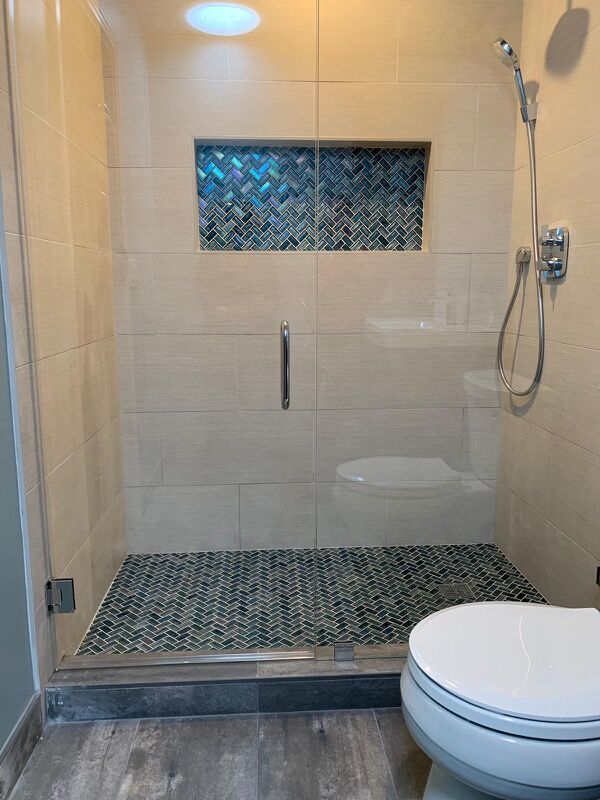What is the ideal shower floor tile? Choosing the right material for your shower floor is a critical decision that can impact the durability, aesthetics, and safety of your bathroom. When it comes to the materials, it’s essential to find one that can handle constant moisture, resist slips, and look great. Here’s a look at some of the best materials for shower floors, along with their pros and cons.
1. Porcelain
Porcelain is one of the most popular choices for shower floors, and for good reason. It’s highly durable, water-resistant, and easy to maintain. Porcelain tiles come in a wide variety of styles, textures, and colors, allowing you to achieve virtually any look while enjoying the benefits of a robust material.
- Pros:
- Highly water-resistant
- Durable and long-lasting
- Available in various finishes, including slip-resistant textures
- Easy to clean and maintain
- Cons:
- Can feel cold underfoot
- More expensive than ceramic
2. Marble
Marble is a luxurious natural stone that adds elegance and timeless beauty to any bathroom. It has a soft, veined appearance that enhances the aesthetic of a high-end shower. However, marble is more porous than other materials, meaning it can absorb water and stain easily, making maintenance a bit more demanding.
- Pros:
- Luxurious and elegant appearance
- Available in unique patterns and veining
- Adds a spa-like feel to the shower
- Cons:
- Porous and prone to water absorption
- Requires regular sealing to prevent staining
- Can be slippery when polished, but textured finishes are available
3. Travertine
Travertine, a type of limestone, is another natural stone option that offers a warm and rustic look. It’s softer than marble but still provides a rich, textured appearance that suits both modern and traditional designs. Like marble, travertine is porous and needs sealing to protect it from moisture and stains.
- Pros:
- Warm, earthy appearance
- Textured surface enhances grip
- Timeless and sophisticated
- Cons:
- High maintenance with regular sealing required
- Prone to staining and moisture absorption
- Soft material that can wear over time
4. Granite
Granite is a very durable, hard stone, making it an excellent choice for those seeking a long-lasting and luxurious material. While it’s commonly used for countertops, granite tiles can be used for shower floors. It’s less porous than marble and travertine, making it more resistant to water and stains.
- Pros:
- Highly durable and resistant to water
- Luxurious and polished look
- Less porous than other natural stones
- Cons:
- Can be slippery when wet
- Requires periodic sealing for protection
- Expensive
5. Quartzite
Quartzite is a highly durable natural stone that is more resistant to scratching and staining than marble. It offers a similar appearance to marble, with soft veining, but without the high maintenance requirements. Quartzite is an excellent option for those who want the look of natural stone but with better water resistance.
- Pros:
- Strong and durable
- More stain-resistant than marble
- Beautiful, natural stone appearance
- Cons:
- Needs sealing to protect from water and stains
- Can be expensive
- Limited color options compared to porcelain
6. Ceramic
Ceramic tiles are a budget-friendly option and share many of the same benefits as porcelain. However, ceramic is not as durable as porcelain and can be more prone to cracking. Still, it’s a good option for those looking for an affordable material that’s available in a wide range of colors and styles.
- Pros:
- Affordable
- Available in many styles and colors
- Easy to install and replace
- Cons:
- Less durable than porcelain
- Can be slippery when polished, so opt for a textured surface
Conclusion
What is the ideal shower floor tile depends on your priorities. For durability and easy maintenance, porcelain is a top choice. If luxury and elegance are what you’re after, marble or quartzite provide a beautiful, high-end finish. Travertine offers a warm, natural look, while granite adds durability with a refined polish. Regardless of your choice, make sure to prioritize safety by opting for slip-resistant finishes and textures.

